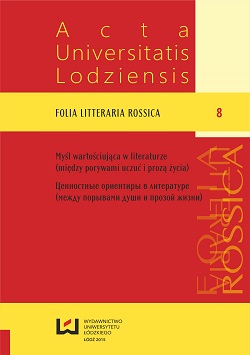German museum in Polish theatre?
DOI:
https://doi.org/10.18778/1427-9681.08.23Keywords:
contemporary German drama/theatre, contemporary Polish drama/theatre, transculturalityAbstract
The paper concerns the influence of German drama and theatre on the theatre work in Poland after 1989. It is an attempt to capture the mechanism of this phenomenon and to test theoretical tools to describe and interpret it. Wolfgang Welsch’s concept of transculturality (1992) has been employed, with its assumption that homogeneity is a constitutive feature of neither the contemporary multicultural societies nor contemporary cultures any longer, and that the former formula of the whole has been replaced by the formula of differentiation. Taking into consideration Welsch’s thesis that contemporary cultures are characterised by blending and mutual permeation, selected examples were presented to illustrate the impact of German drama-theatre practice on Polish theatre: the dynamic development of the young drama, the ways of understanding national drama and the emergence of political theatre as a new phenomenon in the Polish tradition.
Downloads
References
Ankersmit F. R., Historiografia i postmodernizm, [w:] Postmodernizm. Antologia, red. R. Nycz, Kraków 1996.
Google Scholar
Berger P. L., Berger B., Kellner H., The Homeless Mind. Modernization and Consciousness, New York 1973.
Google Scholar
Derkaczew J., Na teatralnym Zachodzie czas zmian „Gazeta Wyborcza” 2009, № 98.
Google Scholar
Intelektualiści czy artyści. Z reżyserami rozmawiają Iga Dzieciuchowicz, Anna Herbut, Joanna Targoń, „Didaskalia” 78/2007.
Google Scholar
Leyko M., Der gewollte und der ungewollte Brecht, [w:] Polnisch-deutsche Theater beziehungen seit dem Zweiten Weltkrieg, red. von Hans-Peter Bayerdörfer we współpracy z M. Leyko, M. Sugierą, Niemeyer Verlag, Tübingen 1998.
Google Scholar
DOI: https://doi.org/10.1515/9783110913095-005
Naści, piesku, kiełbaski. Rozmowa Wojtka Klemma z Joanną Wichowską (11.07.2009), [Źródło internetowe] http://www.google.pl/search?sourceid=navclient&hl=pl&ie=UTF8&rlz=1T4G-GLL_plPL307PL308&q=klemm+kie%c5%82baski [26.06.2011].
Google Scholar
Niemieckie fale. Rozmowa Anny R. Burzyńskiej, Joanny Derkaczew, Łukasza Drewniaka i Piotra Olkusza, „Dialog” 2010, № 9.
Google Scholar
Prussak M., Koniec „naszego narodowego dramatu”, [w:] 20-lecie. Teatr polski po 1989, red. D. Jarząbek, M. Kościelniak, G. Niziołek, Kraków 2010.
Google Scholar
Schiller L., Teatry berlińskie w lutym i marcu 1953. Kartki z raptularza, „Pamiętnik Teatralny” 1953, z. 3.
Google Scholar
Welsch W., Transkulturowość. Nowa koncepcja kultury. Problemy ponowoczesnej pluralizacji kultury. Wokół koncepcji Wolfganga Welscha, część I, red. A. Zeidler-Janiszewska, Poznań 1998.
Google Scholar
[Źródło internetowe] http://www.teatrpolonia.pl/spektakl-romulus-wielki/recenzje/3179 [24.06.2011].
Google Scholar
Downloads
Published
How to Cite
Issue
Section
License

This work is licensed under a Creative Commons Attribution-NonCommercial-NoDerivatives 4.0 International License.












